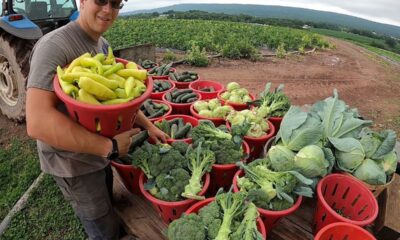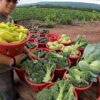Canada Visa
Here are Things to Know Before Applying for a Farm Job in Canada
Farm jobs in Canada offer great opportunities for both local and foreign workers. However, before applying, there are important factors to consider to ensure a smooth experience. Here’s what you need to know:
1. Understand the Job Requirements
Farm jobs can be physically demanding and require long hours, often in varying weather conditions. Be prepared for:
- Early morning or late evening shifts
- Heavy lifting and repetitive tasks
- Outdoor work in different weather conditions
2. Know the Different Types of Farm Jobs
There are various farm job categories, including:
- Fruit and Vegetable Picking – Seasonal and labor-intensive
- Livestock Farm Work – Caring for cattle, poultry, and other animals
- Greenhouse and Nursery Jobs – Working in controlled environments
- Farm Equipment Operation – Requires experience handling machinery
3. Research the Salary and Benefits
Salaries for farm jobs vary depending on the job type and location. Some farms offer:
- Hourly pay ranging from $14 to $22 per hour
- Overtime pay during peak seasons
- Accommodation and meals for workers
Check out List of Farm Jobs you Can Apply in Canada
4. Work Permit Requirements for Foreign Workers
If you’re applying as a foreign worker, check Canada’s Temporary Foreign Worker Program (TFWP) or Seasonal Agricultural Worker Program (SAWP) for eligibility. These programs allow farm employers to hire international workers legally.
5. Choose the Right Location
Some provinces have a higher demand for farm workers, including:
- British Columbia – Fruit and berry farms
- Ontario – Vegetable and greenhouse farming
- Alberta & Saskatchewan – Cattle and grain farms
6. Be Aware of Housing and Living Conditions
Many farms provide accommodation for workers, but it’s essential to check:
- Living arrangements (shared rooms or dormitory-style housing)
- Proximity to local amenities
- Cost deductions for accommodation (if applicable)
7. Learn About Farm Safety and Regulations
Farms follow strict safety guidelines to protect workers. Before starting a farm job, familiarize yourself with:
- Proper handling of tools and equipment
- Health and safety regulations
- Emergency procedures
Check List of Farm Jobs Available in Canada
8. Prepare for the Job Interview
Some farms conduct interviews before hiring. Be ready to answer questions like:
- Do you have experience in farming?
- Are you comfortable working in different weather conditions?
- Can you work long hours or weekends during peak harvest season?
9. Develop Necessary Skills
While many farm jobs require no formal education, some skills can give you an advantage:
- Physical endurance and stamina
- Ability to operate basic farm machinery
- Knowledge of planting, harvesting, or animal care
10. Have Realistic Expectations
Farm jobs can be rewarding but also physically demanding. Being mentally and physically prepared will help you adapt quickly and enjoy the experience.
Check List of Farm Jobs Available in Canada
Final Thoughts
Applying for a farm job in Canada can be a great opportunity, especially for those looking for seasonal or entry-level work. By understanding job expectations, researching locations, and preparing for the challenges, you can increase your chances of a successful farm job experience.










